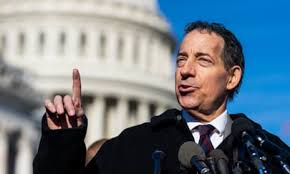FnF News
“The New Elitists?” Jamie Raskin Under Fire for Dismissing Dissent as Public Trust in Congress Craters
By Khadija Khan | FNF News | June 13, 2025
WASHINGTON, D.C. — In an age when the American public is increasingly disillusioned with its political leaders, Representative Jamie Raskin—once hailed as a constitutional scholar and voice of integrity—is now drawing sharp criticism from citizens and commentators alike for behavior some are calling dismissive, arrogant, and emblematic of a wider trend among America’s political class.
The backlash comes after a series of recent confrontations in which Raskin appeared visibly irritated, even contemptuous, toward constituents and activists who questioned his positions on free speech, Gaza protests, and his unwavering loyalty to party lines. A recent viral clip shows Raskin wagging a finger at a young protester, calling their question “absurd” and refusing to engage further. The moment has since sparked a fierce national conversation about decorum, power, and accountability.
“Raskin used to be one of the good ones,” said civil liberties organizer Eric Moreno. “Now he treats the public like we’re annoying undergrads interrupting his lecture.”
From Defender of Democracy to Gatekeeper of Dialogue?
Raskin’s national rise began with his work on the House Select Committee investigating the January 6 insurrection. His fiery speeches and legal precision earned him admiration across the political left and elevated his profile beyond Maryland. But five years later, critics argue that Raskin has grown increasingly insulated—less the defender of democratic values, and more a gatekeeper deciding who deserves a voice.
“What we’re seeing is a shift from democratic engagement to democratic condescension,” says political analyst Darnell Hayes. “Raskin doesn’t just disagree anymore—he disdains.”
Activists who have approached Raskin at town halls and Capitol Hill say the Congressman has developed a pattern: when asked uncomfortable questions—especially around civil liberties, government surveillance, or U.S. foreign policy—he avoids direct answers, dismisses critics as unserious, or refuses to speak altogether.
“We’re Not the Enemy”: Citizen Voices Silenced
On the steps of the Capitol last week, a group of peaceful demonstrators—mostly young people—held up signs reading “Ask the People, Not the Donors” and “Debate, Don’t Dismiss.” When Raskin walked past, he was asked why he opposed a resolution condemning censorship in universities. Instead of answering, he waved his hand and muttered, “Not worth responding to.”
“That moment shattered something for me,” said college student Leila Wassim. “I used to admire him. Now I feel invisible.”
Similar reports have emerged from across Maryland’s 8th District. In a recent town hall in Silver Spring, Raskin refused to answer a question about bipartisan surveillance reform, calling the issue “fringe.” A visibly upset attendee shouted, “You work for us!” before being escorted out by staff.
The Rise of Political Elitism—and Why It Matters
Raskin’s critics say his behavior reflects a broader cultural shift in Washington: the rise of the “New Elitists”—progressive lawmakers who campaign on inclusion and justice, but once in office, grow dismissive of anyone outside their policy bubble.
“There’s a real disconnect,” says historian Melody Kravitz. “Elitism isn’t just about wealth anymore—it’s about attitude. And we’re seeing it across the board, left and right.”
Polling backs this up. According to Pew Research, 73% of Americans now believe their elected officials “don’t understand the daily lives of ordinary people.” That number was just 54% a decade ago.
The phrase “The Little People” has re-emerged in online discourse—not as a self-deprecating joke, but as a serious indictment of a ruling class seen as increasingly unreachable and uninterested in listening.
Defenders Say Raskin Is Being Unfairly Targeted
Some argue the criticism of Raskin is overblown, pointing out his history of public service and intellectual rigor.
“He’s one of the few still grounded in constitutional values,” said MSNBC contributor Laura Kaplan. “People conflate ‘not agreeing’ with ‘not engaging.’ Sometimes bad-faith actors don’t deserve airtime.”
But even longtime Raskin supporters admit his tone has changed. His speeches are sharper, his patience thinner, and his appearances on the Hill more guarded.
“He’s gone from a teacher to a scolder,” said one former campaign aide on condition of anonymity. “That matters.”
A Symptom of a Larger Crisis
The issue isn’t just about Jamie Raskin. It’s about what happens when elected officials—no matter how well-intentioned—begin to see skepticism from the public not as engagement, but as disrespect.
“In a democracy, the right to question power is sacred,” says ACLU director Kendra Malik. “When public servants start treating citizens like hecklers, it’s time to re-evaluate who’s serving whom.”
And yet, this crisis of representation shows no signs of slowing. Raskin is just the latest name in a growing list of lawmakers—from both parties—who are being called out for dodging questions, fleeing protests, or outright mocking constituents.
Conclusion: The Echo Chamber on the Hill
In today’s Capitol Hill, public criticism is often filtered through staff, ignored in media appearances, or repackaged as political attacks. But outside those marble walls, Americans are hurting, questioning, and desperately trying to be heard.
“We don’t need our representatives to agree with everything we say,” said protester James Morelli. “But we need them to listen.”
As Raskin walks past another group of chanting activists, the message on one of their signs rings loudest:
“If you’re too important to answer questions, you’re not important enough to lead.”

